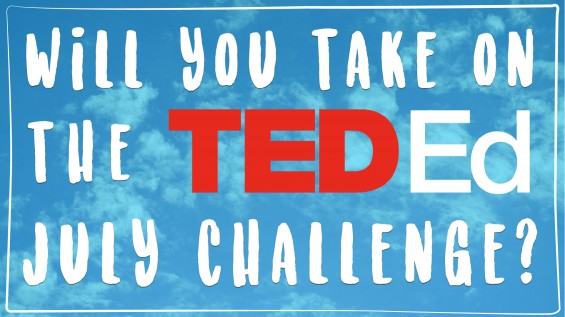
TED-Ed July Challenge: Here’s the archive of daily lessons
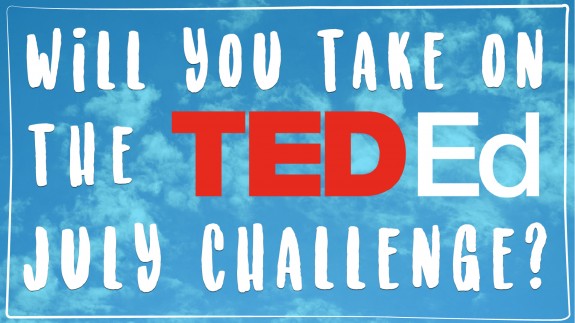
Did you sign up to keep your brain in shape this summer — and learn 31 new ideas in the month of July? If so, you’re in great company. Around the world, more than 10,000 of you signed up to take the TED-Ed July Challenge this year. Keep up the great work, challengers! Below, catch up on any lessons you missed with the TED-Ed July Challenge lesson archive. We’ll be updating this post regularly with archive lessons as the TED-Ed July Challenge unfolds.
TED-Ed July Challenge lesson archive
July 1: The power of a great introduction
Never underestimate the power of an intriguing start. When analyzing the literary greats like Charles Dickens and Kurt Vonnegut, be inspired by their craft and learn how to write a tantalizing introduction and strong thesis. Take the lesson here »
July 2: Why do cats act so weird?
They’re cute, they’re lovable, and judging by the 26 billion views on over 2 million YouTube videos of them, one thing is certain: cats are very entertaining. But their strange feline behaviors, both amusing and baffling, leave many of us asking: Why do cats do that? Tony Buffington explains the science behind some of your cat’s strangest behaviors. Take the lesson here »
July 3: The science behind the myth: Homer’s “Odyssey”
Homer’s “Odyssey” recounts the adventures of the Greek hero Odysseus during his journey home from the Trojan War. Though some parts may be based on real events, the encounters with monsters, giants and magicians are considered to be complete fiction. But might there be more to these myths than meets the eye? Matt Kaplan explains why there might be more reality behind the “Odyssey” than many realize. Take the lesson here »
July 4: The oddities of the first American election
How did George Washington become the first president of the United States in 1789? Who got to decide — or vote — who would become president, and how did they decide the winner? Kenneth C. Davis unveils the surprising story behind America’s first presidential election. Take the lesson here »
July 5: What would happen if you didn’t sleep?
In the United States, it’s estimated that 30 percent of adults and 66 percent of adolescents are regularly sleep-deprived. This isn’t just a minor inconvenience: staying awake can cause serious bodily harm. Claudia Aguirre shows what happens to your body and brain when you skip sleep. Take the lesson here »
July 6: Tycho Brahe, the scandalous astronomer
If you think scientists lead boring, monotonous lives, you must not know about Tycho Brahe. The 16th century astronomer who accurately predicted planetary motion led quite a dramatic life — complete with a kidnapping, a sword duel and even a clairvoyant dwarf. Dan Wenkel dives into the history behind this sensational scientist, explaining how he continued to inspire intrigue even after his death. Take the lesson here »
July 7: Got seeds? Now add bleach, acid and sandpaper
For a seed to start growing, its embryo must emerge from its hard coat. In nature the embryo is aided by frost and animal digestion — but humans can help too. Nicking, filing, and soaking the seed in hot water or acid are all forms of scarification, or ways to speed up germination by breaking down the shell. Mary Koga offers some tips to spur your sprouts (and don’t forget the bleach!). Take the lesson here »
July 8: Why do people have seasonal allergies?
Ah, spring. Grass growing, flowers blooming, trees budding. For those with allergies, though, this explosion of new life probably inspires more dread than joy. So what’s behind this annual onslaught of mucus? Eleanor Nelsen explains what happens when your immune system goes rogue. Take the lesson here »
July 9: The ancient origins of the Olympics
Thousands of years in the making, the Olympics began as part of a religious festival honoring the Greek god Zeus in the rural Greek town of Olympia. But how did it become the greatest show of sporting excellence on earth? Armand D’Angour explains the evolution of the Olympics. Take the lesson here »
July 10: The psychology of narcissism
Narcissism isn’t just a personality type that shows up in advice columns; it’s actually a set of traits classified and studied by psychologists. But what causes it? And can narcissists improve on their negative traits? W. Keith Campbell describes the psychology behind the elevated and sometimes detrimental self-involvement of narcissists. Take the lesson here »
July 11: The evolution of the book
What makes a book a book? Is it just anything that stores and communicates information? Or does it have to do with paper, binding, font, ink, its weight in your hands, the smell of the pages? To answer these questions, Julie Dreyfuss goes back to the start of the book as we know it to show how these elements came together to make something more than the sum of their parts. Take the lesson here »
July 12: How the food you eat affects your brain
When it comes to what you bite, chew and swallow, your choices have a direct and long-lasting effect on the most powerful organ in your body: your brain. So which foods cause you to feel so tired after lunch? Or so restless at night? Mia Nacamulli takes you into the brain to find out. Take the lesson here »
July 13: Earworms: Those songs that get stuck in your head
Have you ever been waiting in line at the grocery store, innocently perusing the magazine rack, when a song pops into your head? Not the whole song, but a fragment of it that plays and replays until you find yourself unloading the vegetables in time to the beat? Elizabeth Hellmuth Margulis explores earworms — a cognitive phenomenon that plagues over 90% of people at least once a week. Take the lesson here »
July 14: The science of skin color
When ultraviolet sunlight hits our skin, it affects each of us differently. Depending on skin color, it’ll take only minutes of exposure to turn one person beetroot-pink, while another requires hours to experience the slightest change. What’s to account for that difference, and how did our skin come to take on so many different hues to begin with? Angela Koine Flynn describes the science of skin color. Take the lesson here »
July 15: What would happen if you didn’t drink water?
Water is essentially everywhere in our world, and the average human is composed of between 55 and 60% water. So what role does water play in our bodies, and how much do we actually need to drink to stay healthy? Mia Nacamulli details the health benefits of hydration. Take the lesson here »
July 16: When to use apostrophes
It’s possessive. It’s often followed by S’s. And it’s sometimes tricky when it comes to its usage. It’s the apostrophe. Laura McClure gives a refresher on when to use apostrophes in writing. Take the lesson here »
July 17: The pleasure of poetic pattern
Humans are creatures of rhythm and repetition. From our breath to our gait: rhythm is central to our experience, and often brings us pleasure. We can find pleasure in the rhythm of a song, or even the rows of an orchard. Of course, too much repetition can also backfire. David Silverstein describes what poetic repetition is and why it works. Take the lesson here »
July 18: What is depression?
Depression is the leading cause of disability in the world; in the United States, close to ten percent of adults struggle with the disease. But because it’s a mental illness, it can be a lot harder to understand than, say, high cholesterol. Helen M. Farrell examines the symptoms and treatments of depression, and gives some tips for how you might help a friend who is suffering. Take the lesson here »
July 19: What does it mean to be a refugee?
About 60 million people around the globe have been forced to leave their homes to escape war, violence and persecution. The majority have become Internally Displaced Persons, meaning they fled their homes but are still in their own countries. Others, referred to as refugees, sought shelter outside their own country. But what does that term really mean? Benedetta Berti and Evelien Borgman explain. Take the lesson here »
July 20: How does the thyroid manage your metabolism?
Nestled in the tissues of your neck is a small, unassuming organ that wields enormous power over your body: the thyroid. Emma Bryce explains how the thyroid, like the operations manager in a company, is tasked with making sure that all the cells in your body are working properly. Take the lesson here »
July 21: How statistics can be misleading
Statistics are persuasive. So much so that people, organizations, and whole countries base some of their most important decisions on organized data. But any set of statistics might have something lurking inside it that can turn the results completely upside down. Mark Liddell investigates Simpson’s paradox. Take the lesson here »
July 22: What “Orwellian” really means
If you’ve watched the news or followed politics, chances are you’ve heard the term Orwellian thrown around in one context or another. But have you ever stopped to think about what it really means, or why it’s used so often? Noah Tavlin dissects the term. Take the lesson here »
July 23: Mining literature for deeper meanings
Writing a great English paper can be tough because literature doesn’t always reveal its deeper meanings immediately. You might not know Mr. Darcy’s true feelings for Elizabeth Bennett in Jane Austen’s Pride and Prejudice or grasp the complex moral universe of Toni Morrison’s Beloved at first reading. Amy E. Harter offers a few tips on how to read and write more critically and thoughtfully. Take the lesson here »
July 24: The ethical dilemma of self-driving cars
Self-driving cars are already cruising the streets today. And while these cars will ultimately be safer and cleaner than their manual counterparts, they can’t completely avoid accidents altogether. How should the car be programmed if it encounters an unavoidable accident? Patrick Lin navigates the murky ethics of self-driving cars. Take the lesson here »
July 25: How did clouds get their names?
The study of clouds has always been a daydreamer’s science, aptly founded by a thoughtful young man whose favorite activity was staring out of the window at the sky. Richard Hamblyn tells the history of Luke Howard, the man who classified the clouds and forever changed humanity’s understanding of these changeable, mysterious objects. Take the lesson here »
July 26: Who was Confucius?
Most people recognize his name and know that he is famous for having said something, but considering the long-lasting impact his teachings have had on the world, very few people know who Confucius really was, what he really said… and why. Bryan W. Van Norden reveals the man behind the mystery. Take the lesson here »
July 27: A poetic experiment: Walt Whitman, interpreted by three animators
Take a journey through Walt Whitman’s poem ‘A Noiseless Patient Spider’ with the help of three animators who each used a different animation style to bring this beautiful poem to life. Take the lesson here »
July 28: Why is biodiversity so important?
Our planet’s diverse, thriving ecosystems may seem like permanent fixtures, but they’re actually vulnerable to collapse. Jungles can become deserts, and reefs can become lifeless rocks. What makes one ecosystem strong and another weak in the face of change? Kim Preshoff details why the answer, to a large extent, is biodiversity. Take the lesson here »
July 29: How stress affects the brain
Stress isn’t always a bad thing; it can be handy for a burst of extra energy and focus, like when you’re playing a competitive sport or have to speak in public. But when it’s continuous, it actually begins to change your brain. Madhumita Murgia shows how chronic stress can affect brain size, its structure, and how it functions, right down to the level of your genes. Take the lesson here »
July 30: Can robots be creative?
People have been grappling with the question of artificial creativity — alongside the question of artificial intelligence — for over 170 years. For instance, could we program machines to create high quality original music? And if we do, is it the machine or the programmer that exhibits creativity? Gil Weinberg investigates this creative conundrum. Take the lesson here »
July 31: Can you solve the locker riddle?
Your rich, eccentric uncle just passed away, and you and your 99 nasty relatives have been invited to the reading of his will. He wanted to leave all of his money to you, but he knew that if he did, your relatives would pester you forever. Can you solve the riddle he left for you and get the inheritance? Lisa Winer shows how. Take the lesson here »
Congratulations for participating in this year’s TED-Ed July Challenge! To find out about future TED-Ed Challenges, sign up for the TED-Ed weekly newsletter here >>
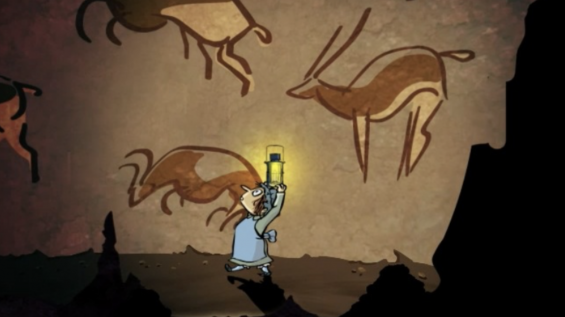
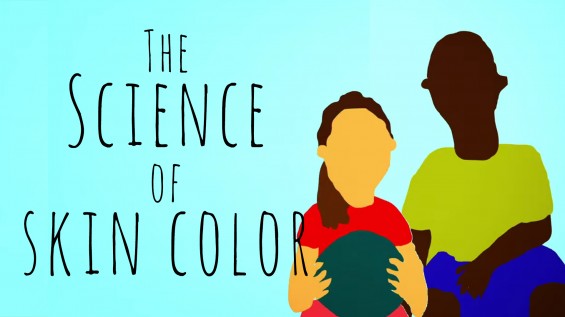
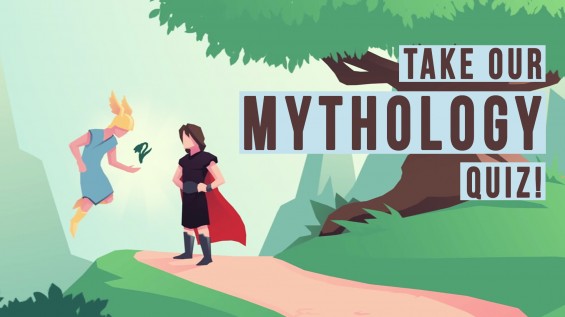
I didn’t get day 9 via email, anyone got any idea what happened?
Charlotte: check your spam folder, it might have gotten caught! Meanwhile, here is Lesson 9: http://ed.ted.com/lessons/the-ancient-origins-of-the-olympics-armand-d-angour
I have been missing several of the lessons, mostly on the weekends. Not sure why I get them one day and not another…
is it necessary to do the discussion? Is there any way to check which lessons have been completed so far?